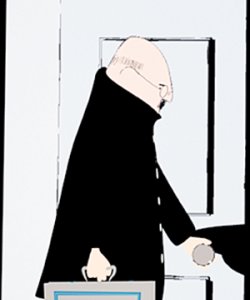Motionpoems Gets Moving

A Minneapolis-based collaborative brings poetry to life through a series of animated films.
Jump to navigation Skip to content

A Minneapolis-based collaborative brings poetry to life through a series of animated films.
“Yet knowing how way leads on to way, I doubted if I should ever come back.” This interpretation of Robert Frost’s “The Road Not Taken” uses serene footage from British Columbia, Canada, expressed through the engaging cinematography of Marty Mellway.
The end of 2013 has arrived. Considering we are all on earth for a limited amount of time, it is important to reflect and appreciate the end, and beginning, of another year. Take time away from the popping champagne bottles, boisterous countdowns, and feigned promises of resolutions. Sit alone somewhere and ruminate on the past year. Slow down. Think. Be grateful. Write a poem about your thoughts and emotions as you recall the people, moments, and events that brought you joy and sadness this past year. Time is indifferent to life and death. This is why poetry exists.
“We must love one another or die.” In this poignant video, Tom O’Bedlam reads W. H. Auden’s poem “September 1, 1939.” The compelling visual imagery of our shared planet, captured by the International Space Station, underscores the power of poetry to transcend both distance and time.
“All night a woman down the hall screamed how a wound wanted its knife back.” This Motionpoem video offers a dark and existential interpretation of Dean Young’s poem “Discharged Into Clouds.”
Despite the commercialism, stress, and anxiety over gifts and travel, the holidays are a time to reflect on the more endearing aspects of humanity: our ability to love, connect with, and help those around us—including strangers. Write a poem that explores the complexities of the human heart and mind, and how the holiday season—if only for a few days or even moments—brings out the best in the poetically flawed human condition.
“Aren’t we enlarged by the scale of what we’re able to desire?” Filmed at the 2008 Geraldine R. Dodge Poetry Festival, poet Mark Doty reads his compelling poem “Messiah (Christmas Portions).”
The Sonora Review is currently accepting submissions to its annual poetry contest, given for a poem or group of poems. The winner will receive a prize of $1,000 and publication in Sonora Review. The deadline is February 14.
Eduardo C. Corral, the winner of the 2011 Yale Younger Poets Prize and author of the collection Slow Lightning (Yale University Press, 2012), will judge.
Poets may submit three to five pages of poetry and a $15 entry fee using the online submission system or by postal mail to Mike Coakley and Laura Miller, Editors in Chief,  c/o Poetry Editorial Board, Sonora Review, English Deptartment, University of Arizona, Tucson, AZ 85719. A cover letter with a brief biography and contact information should be included with submissions, but names should be removed from all manuscript pages. The winner will be published in Issue 66 of Sonora Review; finalists will also be considered for publication.
c/o Poetry Editorial Board, Sonora Review, English Deptartment, University of Arizona, Tucson, AZ 85719. A cover letter with a brief biography and contact information should be included with submissions, but names should be removed from all manuscript pages. The winner will be published in Issue 66 of Sonora Review; finalists will also be considered for publication.
The winner of the 2013 prize, judged by Dawn Lundy Martin, was Shawn Fawson. Kenzie Allen won the second-place prize, and Cat Richardson received the third-place prize. The winning works can be read in Issue 63.
Founded in 1980, Sonora Review is one of the oldest student-run literary journals in the country. Each issue is edited and assembled by an all-volunteer staff of graduate students in the Creative Writing Department at the University of Arizona. Former staff members include Robert Boswell, Antonya Nelson, Tony Hoagland, Richard Russo, Richard Siken, and David Foster Wallace. Work originally published in the Sonora Review has appeared in the Best American Poetry and Best of the West anthologies, and has won O. Henry Awards and Pushcart Prizes. Visit the website for more information.
“Empty and full have the same glass, though neither shows you the way.” Poet Charles Wright discusses his creative process, the power of language, and the subjects that influence and define his poetry.
Sounds are filled with meaning. Poets can use sounds not only to create wonderful and complex worlds through words, but also to create a rhythm and flow that gives life to the wind, the footsteps, and closing doors around us. Sit quietly somewhere with colorful and unique sounds: an art museum, a lonely riverbank, or a bustling subway station. Write a poem about the sounds you hear. Focus on the poetry and music of the sounds, and how the sounds put everything else—nature, life, and death—into context.